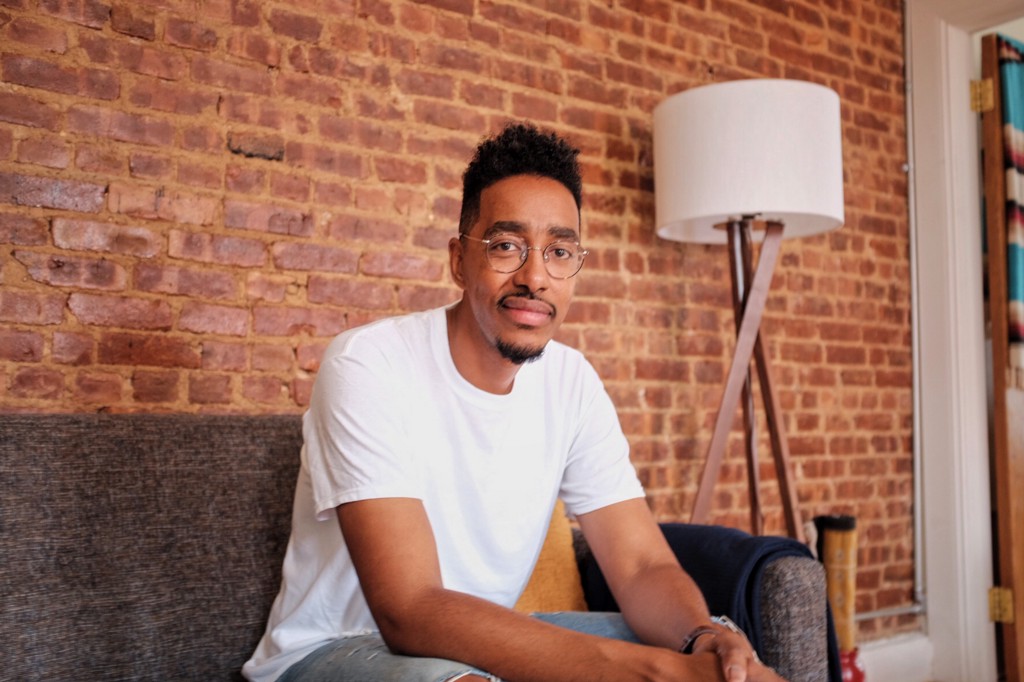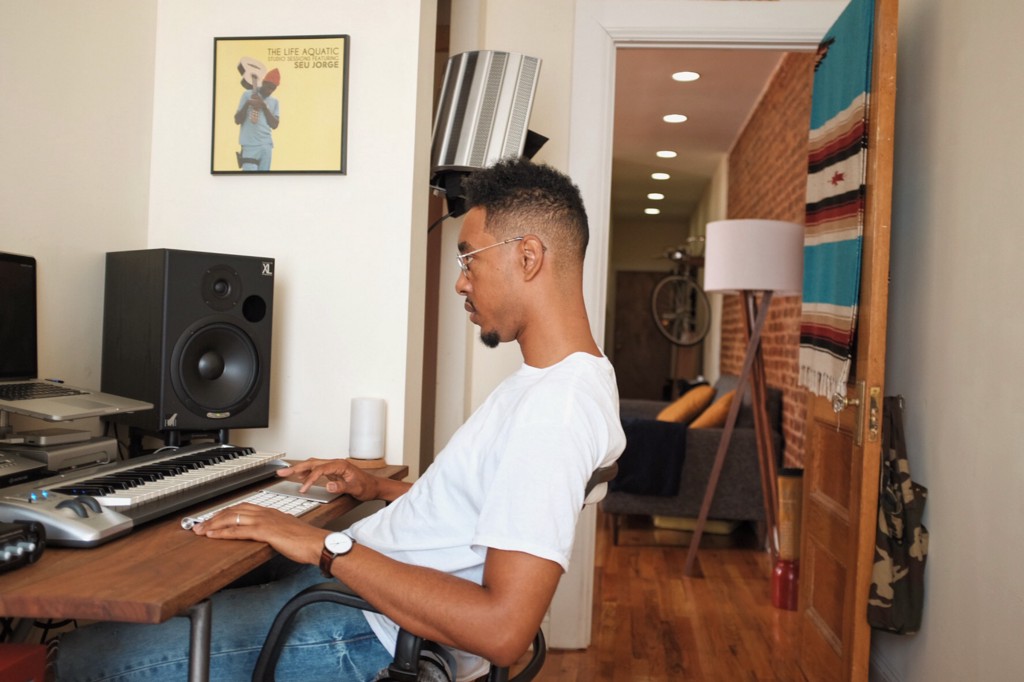Oddisee Belongs to the World
A morning with the highbrow hip-hop ambassador

People Hear What They See, proclaimed the 2012 album by Amir Mohamed el Khalifa, the rapper and composer known as Oddisee. Before a performance at June’s Northside Festival I met the wiry, sleepy-eyed Sudanese-American from Maryland, one of hip-hop’s most highbrow stars, at his Brooklyn apartment. An espresso bar and an upscale infant clothier had just opened on Malcolm X Boulevard, Bed-Stuy’s Orthodox Jews scuttled en masse to sabbath services, and a trio of Airedales roamed within the rusted fencing of Fulton Park footsteps from the blocks made infamous by Jay-Z, Fabolous, and the Notorious B.I.G.
In the last three months, Oddisee released a surprise rap EP, Alwasta, an instrumental record titled The Odd Tape, and embarked upon a thirty-date international tour with his band, Good Compny. Conceived and recorded in the span of one week, Alwasta voices the leeriness of immigrants and Muslim-Americans in an election year. The Odd Tape reached #12 on iTunes’ hip hop chart, rare for an independent release, and even rarer for one without vocals. “My father taught me never to put all my eggs in one basket,” he said. “So I did my best to chart a career that allowed me to make instrumental records, solo records that were expressive and jazz-oriented, and to tour with a band playing acoustic material.”
Oddisee ascended as one-third of D.C.-area supergroup Diamond District, whose 2009 debut In the Ruff was heralded as a hearkening to the no-frills underground rap of the mid-1990s. Featuring articulate, streetwise raps over sturdy percussion, it was an Avengers-style team-up and rallying cry from a metropolis that still lacked a national hip hop star (in the pre-Wale days).
In creating the group, he said they wanted to “carve out an identity for the District of Columbia and its surrounding areas, to create the record that we didn’t have in the mid-90s. New York, Atlanta, Houston, and Los Angeles had so many odes to their neighborhoods, streets, corners, establishments. We never had that record to immortalize our area. I wanted to do that.”

Oddisee was the first act signed and remains the flagship artist on Mello Music Group, an Arizona label founded by ESL teacher Michael Tolle in 2007. Drawing inspiration from the Blue Note Records catalog, Mello features an eclectic roster of rappers almost exclusively from outside rap’s traditional coastal meccas as well as visual artists showcased on the label’s considerable physical output. Releases are pressed on CDs, cassettes, and specialty vinyl as well as delivered through Bandcamp, Soundcloud, YouTube, and premium streaming services.
“The goal was to create a middle-class American label,” Tolle said. Most of Mello’s acts are highly educated and wear glasses; some are acquired tastes and a few are middle-aged. If Mello’s extended success — predicated on humble, self-deprecating rappers — has indicated anything, it’s that even in rap outsiders need not be unmarketable. With little airplay save for the haven of college radio, promotion is contingent upon a lo-fi online presence and tour dates.

Raised in Prince George County, Maryland, just across the D.C. border, Oddisee spent summers in his father’s native Sudan before moving into Washington for high school. He drew musical inspiration from D.C.’s go-go funk subgenre, embracing faster tempos, softer bass lines, and more sprightly percussion than usually found in East Coast hip-hop, and he also explored rhythms and time signatures of traditional North African music. His instrumental work carries an undeniable sense of place: 2010’s Traveling Man was assembled on tour, with twenty-five short tracks capturing the sounds and feels of their eponymous cities, whereas the lush Rock Creek Park from 2011 was inspired by the leafy national park spanning D.C.’s Northwest quadrant.
A nimble and meticulous vocalist, his unmodified mid-Atlantic delivery is natural but hardly effortless. His hooks often have strategically placed syllables drawn out for emphasis, a tactic similarly employed by younger likeminded D.C. rappers Toine and Quartermaine. On Alwasta’s “Strength & Weakness,” the half-sung, half-rapped chorus embodies the narrative’s hopeful conflictedness, whereas the less emphatic hook of “Asked About You” injects the song’s grappling uncertainty with a playful vivacity. The rhyme schemes — over strata of synths, horns, bells, and live drums — are dense, but seldom difficult. Sociopolitical lyrics strive to be observant rather than preachy, as on “Lifting Shadows” which drips with the paranoia of a conspiracy thriller:
I’m just an artist, you’re not a target, no use in arguing we all look the same
With that knowledge I stay calm, when they search for bombs all they find is grain
All in the name, I got a name that’ll scare all the brave in the land of the free
All in the name of protecting a country that’s shooting its citizens dead in the streets
I used to live in Northeast D.C., not too far from Capitol Hill
White House here, trap house there, they were so near you could go by feet
Never mind that ’cause that’s not news, let’s stay glued to war on peace
Who gets blamed, whoever can sway that election toward what the order seeks
“One of my favorite shows growing up was The Simpsons,” he recalled. “As an adult, I’d watch reruns and say, ‘Oh my gosh, that was such an adult joke I didn’t get.’ I realized it was written in layers, and that I needed to do that with my music — to write such that people who are academically advanced will appreciate it on one level, and that people who don’t have the privilege of higher education won’t feel alienated by some high-vocabulary existentialist lyrics that aren’t relatable.”

Examining human behavior and relationships, Oddisee expresses revelry in a nearly universal set of pleasures: love, freedom, hard work, and travel. A serious coffee connoisseur, he tellingly titled The Odd Tape’s early-morning soundscape “No Sugar, No Cream.” He’s afforded a virtually unprecedented degree of experimentation because he’s such an accomplished musician first, but also because he maintains almost unanimous respect among rap’s more conservative gatekeepers with a foot grounded in the precocious, sometimes flippant battle rap of his early work.
“There’s always going to be that one quintessential hip hop track,” he said. “Even on The Odd Tape the interludes are very boom bap, old school, whereas the instrumentals for the full tracks are a bit more aggressive. I’m conscious of my multiple audiences, but I never feel the need to compromise myself because I love all those sounds.”
Oddisee outwardly embraced the avant-garde that was always at the heart of his music. His braids were a casualty of the same purgative epoch that Ludacris and Carmelo Anthony’s were. After years of critical praise on their website, NPR — “Hometown guys,” he laughed — invited him to be one of the first rappers featured on their Tiny Desk concert series. In anticipation of his 2015 album The Good Fight, promotional coffee sleeves were printed and distributed at independent coffeehouses in eight cities. He is currently endorsed by the eyewear brand Etnia Barcelona, and models a line of glasses inspired by the work of Jean-Michel Basquiat.
“A few years back, a friend informed me that NPR’s Marketplace was playing one of my instrumentals in the background,” he remembered. “Then extreme sports companies like Quiksilver and D.C. Shoes started approaching me — surfers and skateboarders were asking to use my music in their videos because it gelled with their concepts. ESPN licensed a song I produced for the NBA Finals. It’s that diversity that allows me to survive as an independent artist.”

The timing of his prominence parallels the Obama presidency, and he has emerged as an authority with an international coalition of progressives, intellectuals, vinyl collectors, internet DJs, jazz and afrobeat heads, classic hip-hop fans, Muslims, politically engaged millennials, and concertgoers who’ve found his music through a breadth of channels. Where the cautious exuberance expressed upon Obama’s election by rap diplomats such as Nas and Jeezy grew garbled and dubious over the recession of his first administration, Oddisee found his voice when theirs went hoarse as a function of limited perspectives. “The lack of critical thinking in the world, especially in America, scares me more than anything Trump could say,” Oddisee said.
Oddisee’s next full-length solo Iceberg is halfway finished and slated for release close to election season. “The theme is taking stories of everyday life — fear, money, achievement, failure — and applying almost a Gladwell perspective, analyzing why things are the way they are,” he said. “Whether it be fear of Muslim and Arab migrants into Europe, Islamophobia in America, or fear of migrant workers taking American jobs, no one thinks critically about the difference between how we see things and how things really are.”
Back in his apartment, Oddisee reflected on his youth. “Going back to Sudan every summer as a kid from America, I’d make a connection stop in this strange land called Europe to go to this place called Africa. It made me realize how small and interconnected everything was, and how much we all belong to everything. My family comes through a diaspora on both sides, one through slavery and the other through war and crisis. I have cousins with British accents, Canadian accents, cousins who don’t speak English. We’re all from the same family, so how important are these nationalities?”
The next night, Good Compny took the stage just after sunset, allowing Oddisee time for a quick bite to break his daylong Ramadan fast. He paused mid-set to address a packed Brooklyn Bowl. “What you’re seeing in the news,” he said, referring to that morning’s tragedy in Orlando, “That’s not Islam.” The sextet proceeded into a rousing rendition of “That’s Love,” the uplifting opening track from The Good Fight. If people hear what they see, perhaps soon they’ll see, in Oddisee’s words, how much we all belong to everything.
Pete Tosiello is a New York-based writer.
